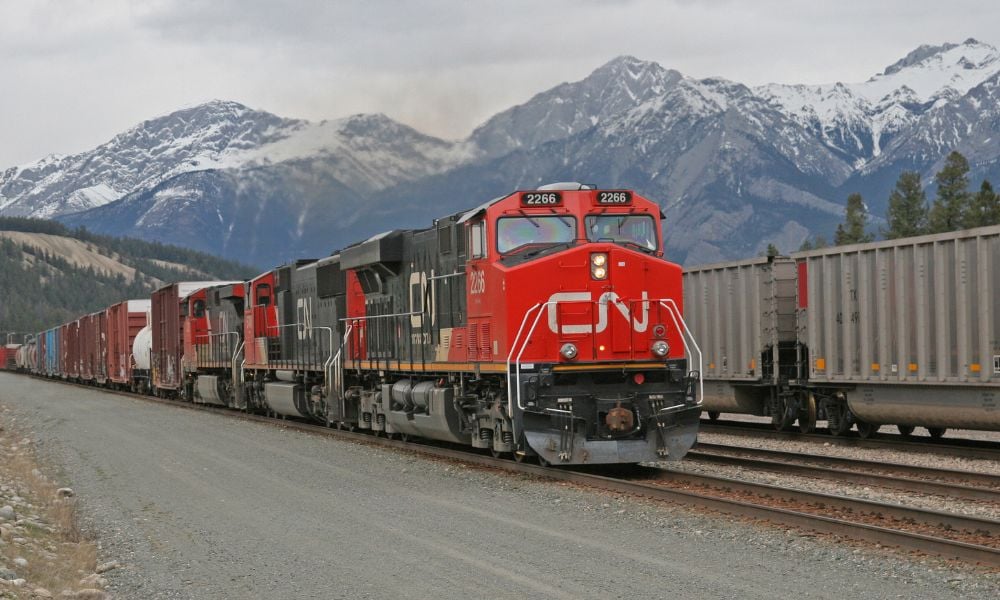Teamsters take down picket lines at CN, stoppage continues at CPKC

The Teamsters Canada Rail Conference says it has taken down picket lines at Canadian National Railway Co. and its workers will begin returning to work on Friday
The Canadian Press
However, the union said the work stoppage at Canadian Pacific Kansas City Ltd. remains ongoing pending an order from the Canada Industrial Relations Board.
Following months of increasingly fraught contract talks, Canada’s two biggest railways both locked out workers after failing to reach deals with the union by a Thursday deadline.
The unprecedented work stoppage prompted federal Labour Minister Steven MacKinnon to refer the dispute to the Canada Industrial Relations Board to impose binding arbitration.
The union and CPKC officials met with the board on Thursday and will meet again Friday.
CPKC said it was prepared to discuss the resumption of service at the meeting with the CIRB, but the union refused and wants to make submissions to challenge the constitutionality of MacKinnon’s direction.
The minister had faced pressure from business groups, who warned of the economic consequences of the work stoppage and urged Ottawa to resolve the dispute.
At a Thursday news conference, MacKinnon maintained the government is “committed totally to collective bargaining,” but said the impacts of the work stoppage are being felt by all Canadians.
The minister said the government gave the negotiations “every possible opportunity to succeed.”
Each side had accused the other of failing to negotiate seriously. The union had said it did not want binding arbitration because the issues were too critical to be left to a third party.
The Teamsters has said both companies are pushing to weaken protections around rest periods and scheduling. It adds that CN is also seeking a scheme that would see some employees move to far-flung locations for several months at a time to fill labour gaps.
The work stoppage affected not only supply chains across the country, but also tens of thousands of commuters in Toronto, Montreal and Vancouver whose lines run on CPKC-owned tracks.
The agency responsible for GO Transit in Ontario said service will remain down Friday on the Milton line and at the Hamilton GO station, while B.C. regional transport provider TransLink said service for the West Coast Express will also remain. Three of the Exo network’s train lines in the Montreal area will also stay down.
Via Rail said trains on its 480-kilometre Sudbury-White River line, which runs three times a week in northern Ontario, are cancelled until the work stoppage is resolved.
Canada – the world’s second-largest country by territory – relies heavily on CN and CP to ship food grains, fertilizers and other commodities, along with manufactured goods such as chemicals and automobiles. The country’s main business lobby group said it estimates losses would hit C$1 billion ($733 million) a day in case the rail stoppages proceed.
Federal mediators are working with the companies and the union, but those involved in the discussion say little progress has been made. The union says CN Rail and CPKC want to dilute safety provisions, a charge the companies deny.
MacKinnon has the power to force the union and railway companies into binding arbitration, but has so far said he wants them to sort out their differences at the negotiating table.
In a statement on Monday, the left-leaning New Democratic Party called on Prime Minister Justin Trudeau to not intervene in the labour disputes. Trudeau’s government is being kept in power by the New Democratic Party, which has traditionally enjoyed strong union support.
Labour talks started early this year, but progress has been slow, with both the union and the companies accusing each other of bad faith.
CN Rail and CPKC have already stopped accepting shipments of hazardous goods and have begun phased shutdowns of operations in Canada.
Maersk said on Monday it would stop accepting some Canada-bound shipments. Separately, U.S. freight forwarder C.H. Robinson (CHRW.O), opens new tab, said on Monday it was diverting some of its U.S. customers’ ocean cargo away from Canadian ports as the threat of a rail strike looms.
“Both railroads simultaneously being out of commission would paralyze the ports and put instant pressure on trucking,” the company said.
Canada is a major agricultural producer, and farmers will start bringing in their harvests in August and September.
Quorum Corp, which monitors grain handling and transportation, said daily volumes in early September would increase to 138,000 metric tons with a value of around C$75 million.
“After a period of time, sales will be lost and the value of Canada’s grain will decrease … the largest concern is a further degradation of Canada’s reliability as a supplier, which is already suffering due to past labor disruptions,” Quorum President Mark Hemmes said in an emailed statement.
Refrigerated containers with meat and some highly perishable produce are of particular concern because delays would likely mean spoilage. Shippers of such items have already begun holding back containers, said Peter Friedmann, an executive director at the Agriculture Transportation Coalition.
In a statement, the Greater Vancouver Board of Trade warned a full work stoppage would drive up prices and exacerbate an affordability crisis in the country.“Every facet of daily life would be impacted as our national economy grinds to a halt,” it said.











